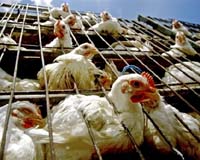 |
Paris (AFP) Feb 7, 2010 The biggest causes of deforestation in tropical countries are population growth in cities and agricultural exports, a finding that should shape decisions on preventing forest loss, experts said Sunday. Under December's Copenhagen Accord, rich countries are pledging some 10 billion dollars over the next three years to help poor countries tackle climate change. A big but so far unspecified chunk of the cash will go on programmes to prevent loss of tropical forests, which is a major source of greenhouse gases. Beyond 2012, tens of billions of dollars per year could be primed if a planned UN pact on curbing climate change comes to fruition. But environmental scientists publishing in the journal Nature Geoscience on Sunday cautioned against a rush to favour schemes that are unlikely to work. A common theory is that pressure on forests can be eased by reducing the population in rural areas, or discouraging rural people from clearing land for fuel or food for their own use. The study, led by Ruth DeFries of New York's Columbia University, looked at satellite data for forest loss in 41 countries from 2000 to 2005 and matched this against a host of other factors. Two much bigger causes accelerated forest loss, they found. One was the demographic growth of the host country's cities. Urbanisation raises consumption levels and boosts demands for agricutural products. City dwellers eat more processed food and meat, which in turn encourages large-scale farming that leads to forest clearance. The other factor is agricultural exports, which also amplified demands for farmland. "The strong trend in movement of people to cities in the tropics is, counter-intuitively, likely to be associated with greater pressures for clearing tropical forests," says the study. "We therefore suggest that policies to reduce deforestation among local, rural populations will not address the main cause of deforestation in the future." Poor tropical countries thus face a dilemma if they want to feed their swelling cities, export food to gain wealth and preserve their forest treasure. One solution, says DeFries, is boost food yields in lands that have already been cleared.
Share This Article With Planet Earth
Related Links Farming Today - Suppliers and Technology
 China to impose anti-dumping penalties on US chicken
China to impose anti-dumping penalties on US chickenBeijing (AFP) Feb 5, 2010 China said Friday it would slap stiff penalties on a variety of US chicken meat it says is being sold at an unfairly low price, in the latest move likely to up the pressure on strained Sino-US relations. The commerce ministry, in a preliminary ruling, said importers of US broiler chicken in China would have to pay deposits based on the difference - up to 105.4 percent - between the meat's ... read more |
|
| The content herein, unless otherwise known to be public domain, are Copyright 1995-2010 - SpaceDaily. AFP and UPI Wire Stories are copyright Agence France-Presse and United Press International. ESA Portal Reports are copyright European Space Agency. All NASA sourced material is public domain. Additional copyrights may apply in whole or part to other bona fide parties. Advertising does not imply endorsement,agreement or approval of any opinions, statements or information provided by SpaceDaily on any Web page published or hosted by SpaceDaily. Privacy Statement |